Rizwan Shafi Wani / Srinagar
The villages of Baba Wayil in central Kashmir follow and impose a strict code against dowry. For this reason, the village located in Ganderbal and about 30 km from Srinagar is also known as the first 'dowry free village' of Kashmir.
The 1500 odd people living in the village mainly live of walnut cultivation and weaving of pashmina shawls. Villagers believe that a curse like a dowry no destroys society and breaks human bonds.
In other parts of Kashmir, a wedding is an ostentatious affair with elaborate celebrations, feasting, and gifting expensive things to the newlyweds. In the village, if anyone is found breaking the rule – demanding or giving dowry – the family has to face a social boycott.
Iqra Bano, a local, who got recently married, told Awaz-the Voice, “I got married in a legal way as per traditions of our village. I am very happy and proud of this village tradition.”
She says that the villagers are not poor to forbid dowry. “The villagers have laid down a set of rules for themselves. Some people in the village who are very rich have good assets. However, we have given up the un-Islamic customs like dowry and get married without any fanfare, so that even poor girls can get married and lead a prosperous life.”
The villagers are happy about the move. So far not a single incident of domestic violence has been reported from here. The youth of the village also support this tradition.
According to Iqra, “Thousands of girls have crossed the marriageable age because they can’t afford dowry and hold ostentatious weddings. Most of the parents are worried about how to raise money for a dowry. Many parents are worried about the future of their daughters as they cannot afford to give them dowry."
It is said that some 750 years ago, Sufi Saint Syed Baba Abdul Razzaq came to Kashmir from Baghdad to propagate Islam and he stayed in this area. It is also his final resting place. Villagers feel it’s perhaps his influence that prevails in the village and keeps people away from social evils, superstitions, and extravagance.
Maulvi Bashir Ahmed Shah, a native who has been performing the duty of Imam in the local Jama Masjid for 30 years, says, “The people here have unanimously banned dowry. For this, we have formally prepared a document that has the signatures of village elders and important persons. In 2021, people have prepared a revised document."
He says, “Allah Almighty says in the Holy Quran that does not waste; Allah does not like an extravagance. We have seen that the society is deteriorating.”
It is noteworthy that the villagers have also submitted a copy of the document to the office of the District Development Commissioner and the Tehsil office. The document states that 'no person has a right to demand jewelry, television, refrigerator, clothes and other items from the bride's family. The document also states that the groom's father will have to pay Rs 50,000 to the groom for buying or buying clothes and other necessities for the bride.
this document was drafted in the year 2004 and signed by the local Imams, elders, and village elders and they have pledged that they will neither accept nor give dowry. So far we are committed to it.
According to Bashir Ahmed Shah, “Everyone in the village is satisfied with this decision. There is no riot in any house, there is no quarrel inside anyone's homes. Everyone has happily accepted this decision. No mother-in-law ever asks her daughter-in-law about such things."
Maulvi Bashir Ahmed says, “At that time we had also decided that if anyone violates this decision, he will be socially boycotted and he will not be allowed to enter the mosque and someone in his family will die. The dead of the family will not be given space for burial in the local cemetery.”
Maulvi Bashir Ahmed wants people across the valley to adopt this practice.

